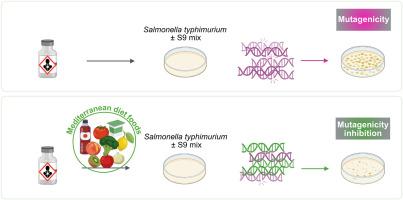利用Ames试验探索地中海饮食食物潜在的抗诱变活性
IF 5.9
1区 农林科学
Q1 FOOD SCIENCE & TECHNOLOGY
引用次数: 0
摘要
人们研究了地中海饮食中许多食物的化合物对心血管的保护作用、抗癌作用以及抗诱变活性。其中,酸奶和富含抗氧化剂的蔬菜等发酵食品被频繁检测。然而,绝大多数研究都是针对食品中的单一功能元素(如细菌菌株或提取的化合物)进行的。不同的是,本研究旨在通过对鼠伤寒沙门氏菌TA98和TA100菌株进行预培养的Ames试验,调查地中海饮食中一组商业相关食品(即酸奶、苹果、柠檬、桃子、猕猴桃、西兰花、洋葱、番茄)是否可以抵消诱变剂(2-硝基芴、叠氮化钠、2-氨基芴)对DNA的影响。酸奶对诱变剂的抑制作用最大,依次为柠檬=猕猴桃>;桃子=西兰花>;洋葱=番茄>;苹果>;本研究结果为进一步研究发酵食品和蔬菜的潜在DNA保护作用奠定了基础。本文章由计算机程序翻译,如有差异,请以英文原文为准。

Exploring the potential antimutagenic activity of foods from Mediterranean diet using the Ames test
Many compounds of foods belonging to the Mediterranean diet were studied for their cardiovascular-protective and anticancer effects, as well as for antimutagenic activities. Among them, fermented foods as yoghurts and vegetables rich in antioxidants were frequently tested. However, the large majority of the studies have been carried out on single functional element of the food (such as bacterial strain or extracted compound).
Differently, this study aimed to investigate whether a panel of commercially relevant foods belonging to Mediterranean diet (namely, yoghurt, apple, lemon, peach, kiwi, broccoli, onion, tomato) can counteract the effects on DNA of mutagens (2-nitrofluorene, sodium azide, 2-aminofluorene) by using the Ames test with pre-incubation on TA98 and TA100 strains of Salmonella typhimurium.
The greatest inhibitory effect of the mutagens was achieved by yoghurt, followed, in decreasing order, by lemon = kiwi > peach = broccoli > onion = tomato > apple > tomato purée.
The present findings provide a foundation for further research on the potential DNA protective activity of fermented foods and vegetables.
求助全文
通过发布文献求助,成功后即可免费获取论文全文。
去求助
来源期刊

Food Bioscience
Biochemistry, Genetics and Molecular Biology-Biochemistry
CiteScore
6.40
自引率
5.80%
发文量
671
审稿时长
27 days
期刊介绍:
Food Bioscience is a peer-reviewed journal that aims to provide a forum for recent developments in the field of bio-related food research. The journal focuses on both fundamental and applied research worldwide, with special attention to ethnic and cultural aspects of food bioresearch.
 求助内容:
求助内容: 应助结果提醒方式:
应助结果提醒方式:


